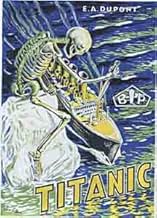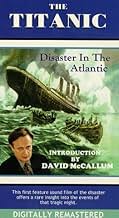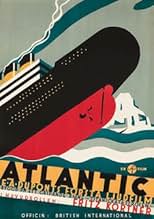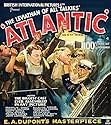Ajouter une intrigue dans votre langueOn its maiden voyage in April 1912, the supposedly unsinkable RMS Titanic hits an iceberg in the Atlantic Ocean.On its maiden voyage in April 1912, the supposedly unsinkable RMS Titanic hits an iceberg in the Atlantic Ocean.On its maiden voyage in April 1912, the supposedly unsinkable RMS Titanic hits an iceberg in the Atlantic Ocean.
- Réalisation
- Scénario
- Casting principal
Gordon James
- Capt. Collins
- (as Sydney Lynn)
Avis à la une
Yes I know "talkies" had just been invented for the cinema 2 years earlier when this was produced in 1929 but this film showed that much had to learnt about the art of producing films.It comes over as a filmed "hammy" stage play with the actors melodramatically enunciating their lines,rolling their eyes, using too many pregnant pauses and using gestures more appropriate to silent cinema, which I suppose was normal during the process of educating them to appear more naturalistic on screen.The gaps between lines spoken should have been tightened up during editing as it considerably slows the film.It is now only of interest for Titanic buffs who want to see an early example of this marine accident on film.In next chronological order they could see "Titanic" (1953) A Night to Remember (1958)"Titanic (1997), to see how the cinema's depiction of this tragedy as evolved over the years.There have been many documentaries and TV films made including the atrocious "SOS Titanic" (1979) On my version which is a DVD, David McCallum gives the introduction.It was he who played Harold Bride Marconi's junior wireless operator in "A Night to Remember"(still the best feature film - please read my "Tribute to Walter" comments on IMDb under Howard Morley.demon.co.uk)and gave the commentary on the series of 4 videos entitled "End of a Dream" so he was well qualified to give the narration.Of more interest I found was a recording accompanied by actual photos of the 1912 US Senate hearing which is also on the DVD.Actors speak the actual words spoken by Lightoller 2nd officer, J Bruce Ismay,Managing director of White Star, Harold Bride and others including Gloria Stewart (The "old Rose" in Titanic 1997) whose voice is used for one of the first class women survivors.
let me firstly say that too many of these reviewers ,particularly the film student,are viewing the film in a modern context and not as a film made at the coming of sound.In an interview given by John Longden for the BBCs programme "Yesterdays witness" he stated that the ridiculously long pauses between dialogue were entirely the idea of the director.So it is unfair to blame the actors for this.Also in that same programme sound men were interviewed.They said that the effects were recorded on a liner berthed at Tilbury.The ship was linked by phone line to Elstree studios.Before each effect someone would come on the line to describe the effect and it would be recorded at Elstree.The problems with early sound films were quite apparent here.few directors here or in America had the skill of Hitchcock in adapting to the new medium.In fact one should praise the attempt to tell the story in what was then effectively a new medium rather than decry the effort some 84 years later because it is old fashioned.no doubt in the year 2097 young film students will be looking at the like of Man of Steel and chuckling at its antique quaintness.
Try to focus on the actual disaster, having just occurred sixteen, seventeen years earlier than when this film came out, and see what was known, what was rumored, what was accepted to have happened, and not dwell on the rawness of the film-making.
Well, that was near impossible to do, right up to the end. I thought Alfred Hitchcock's "Murder" (which came out about the same time) was about one of the most experimental films I had ever seen, but I think this one might outdo it.
The sound is awful, but a silent film done well, or a totally non-talking piece, such as what Laurel & Hardy did, could be just as entertaining, if it has a good story structure. Well, this movie can't claim that either.
Hands down, that mother constantly weeping about her nerves and pressing the hankie to her mouth because she has learned her husband was cheating on her was a constant irritation. Oh, if only she had gone down with the ship!
As with the Barbara Stanwyck-Clifton Webb-Robert Wagner 1953 version, this film delved into adultery. No idea why that theme was always attached to the sinking.
Franklin Dyall, father of the impressive Valentine Dyall (best known for Doctor Who appearances to the American audience) strived for his best Lionel Barrymore, but was outdone in two seconds by Elaine Terriss as his wife, in her brief appearance when she learned he wouldn't enter a lifeboat.
Even to a novice like me, there clearly was a problem with direction; with how sound on the film would sound as opposed to dialogue delivered on stage, as well as to how it was recorded.
I was dumbstruck by Dyall questioning Manchester "you seem to think this is damn serious?"
Wasn't it a really big deal when Clark Gable said 'Damn' in "Gone With the Wind"?
Oh, he was a MAJOR star. A major star doing that. I see.
And I look at most depictions of Blacks in these old films as being historical, but to put a pair of Blacks on this thing just to have them shot because they try to storm the lifeboats I'm sure didn't help race relations back then. While these were actual Black people and not blackface, I tend to try to think how much the performers enjoyed working and getting to dive off the boat like that.
Other than the 1912 version with actual Titanic survivor Dorothy Gibson in it, wearing the outfit she was wearing when she was rescued, this stands as about the earliest version of the disaster. No idea what that Italian 1915 film could be, if it is even based on the ship-in-question.
This film was to be titled Titanic, but outrage and sensitivity toward the event, which again, had just occurred sixteen years earlier, saw a retitling, and it became "Atlantic".
The version I have on tape has a reworked title with the old stock footage of the doomed liner and it is now titled "Titanic". As a film, I would have preferred the original title to be present.
As it is, scenes of the film's disaster, and for that matter still shots I have seen from this movie, did not match up to what was present here, so I'm not sure what is going on as far as editing goes.
There are other Titanic movies depicting the ship to check out, but if you are a buff, like me, you enjoy checking out as many different versions of the Titanic that you can find.
Of all I have seen now (S.O.S. Titanic, 1943 German version, Cameron's Titanic, Night To Remember, George C. Scott-Catherine Zeta Jones, 1953, Unsinkable Molly Brown, even have the recent musical soundtrack), this one has to be the worst.
Well, that was near impossible to do, right up to the end. I thought Alfred Hitchcock's "Murder" (which came out about the same time) was about one of the most experimental films I had ever seen, but I think this one might outdo it.
The sound is awful, but a silent film done well, or a totally non-talking piece, such as what Laurel & Hardy did, could be just as entertaining, if it has a good story structure. Well, this movie can't claim that either.
Hands down, that mother constantly weeping about her nerves and pressing the hankie to her mouth because she has learned her husband was cheating on her was a constant irritation. Oh, if only she had gone down with the ship!
As with the Barbara Stanwyck-Clifton Webb-Robert Wagner 1953 version, this film delved into adultery. No idea why that theme was always attached to the sinking.
Franklin Dyall, father of the impressive Valentine Dyall (best known for Doctor Who appearances to the American audience) strived for his best Lionel Barrymore, but was outdone in two seconds by Elaine Terriss as his wife, in her brief appearance when she learned he wouldn't enter a lifeboat.
Even to a novice like me, there clearly was a problem with direction; with how sound on the film would sound as opposed to dialogue delivered on stage, as well as to how it was recorded.
I was dumbstruck by Dyall questioning Manchester "you seem to think this is damn serious?"
Wasn't it a really big deal when Clark Gable said 'Damn' in "Gone With the Wind"?
Oh, he was a MAJOR star. A major star doing that. I see.
And I look at most depictions of Blacks in these old films as being historical, but to put a pair of Blacks on this thing just to have them shot because they try to storm the lifeboats I'm sure didn't help race relations back then. While these were actual Black people and not blackface, I tend to try to think how much the performers enjoyed working and getting to dive off the boat like that.
Other than the 1912 version with actual Titanic survivor Dorothy Gibson in it, wearing the outfit she was wearing when she was rescued, this stands as about the earliest version of the disaster. No idea what that Italian 1915 film could be, if it is even based on the ship-in-question.
This film was to be titled Titanic, but outrage and sensitivity toward the event, which again, had just occurred sixteen years earlier, saw a retitling, and it became "Atlantic".
The version I have on tape has a reworked title with the old stock footage of the doomed liner and it is now titled "Titanic". As a film, I would have preferred the original title to be present.
As it is, scenes of the film's disaster, and for that matter still shots I have seen from this movie, did not match up to what was present here, so I'm not sure what is going on as far as editing goes.
There are other Titanic movies depicting the ship to check out, but if you are a buff, like me, you enjoy checking out as many different versions of the Titanic that you can find.
Of all I have seen now (S.O.S. Titanic, 1943 German version, Cameron's Titanic, Night To Remember, George C. Scott-Catherine Zeta Jones, 1953, Unsinkable Molly Brown, even have the recent musical soundtrack), this one has to be the worst.
From what I understand this was the first movie about the RMS Titanic that featured sound and it was produced in English, German and French (along with a silent version as well). The title was changed to "Atlantic" for fear of lawsuits. In any case, this film essentially depicts a small handful of passengers who have some interpersonal drama going on both before and after the ship hits the iceberg and begins to sink. Initially, most of the passengers are unaware that the ship is sinking which compounds the problem even more. At least that is the scenario that is portrayed in this particular film. Whether any of that is true or not is unknown to me. Be that as it may, I believe that in order for a person to enjoy this movie it is necessary to appreciate the era in which this film was made and for the viewer to make certain allowances for that fact. Likewise, although there have certainly been better films produced pertaining to the subject at hand, this is still a decent movie overall and I have rated it accordingly. Slightly above average.
How interesting that E.A. Dupont who created one of germany's most memorable silent films (VARIETY) also helmed one of England's first talkies. Obviously he was uneasy with the medium of talking pictures, note how the first 6 minutes of this film is entirely visual. Most of the cast had stage experience, you can tell because they over-exaggerate their lines and cannon out the words like they were playing to the back row. Still this is a well paced dramatic film and the final few minutes have an impact that can stand on their own alongside the later versions, TITANIC and A NIGHT TO REMEMBER. (I am deliberately excluding James Cameron's film with its budget that would have fed a 3rd World country for 10 years and its plethora of computer FX.)
Le saviez-vous
- AnecdotesThe White Star Line forbade the production company from referring to the ship in this film as The Titanic.
- GaffesSet in 1912, he women's hairstyle and dresses are from 1929.
- Versions alternativesReleased with separate English, French and German soundtracks.
- ConnexionsAlternate-language version of Atlantik (1929)
- Bandes originalesWalking With Susie
(uncredited)
Written by G.H. Elliott
Played by the ship's band as Larry and Monica enter the Smoking Room.
Meilleurs choix
Connectez-vous pour évaluer et suivre la liste de favoris afin de recevoir des recommandations personnalisées
Détails
- Date de sortie
- Pays d’origine
- Langue
- Aussi connu sous le nom de
- Titanic: Disaster in the Atlantic
- Lieux de tournage
- Société de production
- Voir plus de crédits d'entreprise sur IMDbPro
Box-office
- Budget
- 2 000 £GB (estimé)
- Durée1 heure 30 minutes
- Couleur
- Rapport de forme
- 1.20 : 1
Contribuer à cette page
Suggérer une modification ou ajouter du contenu manquant



































